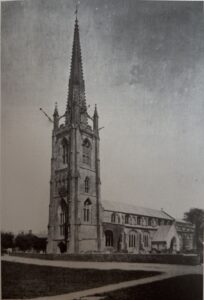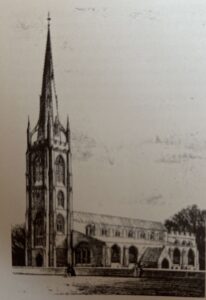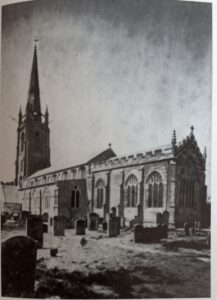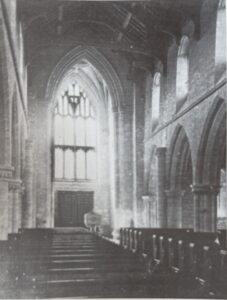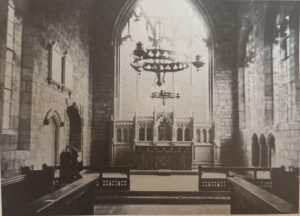Extract taken from Aspects of Spalding Villages by Michael J Elsden.
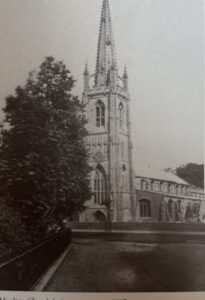
On the 29th January, 1867, the vicar of Moulton, the Rev. J. Jackson wrote a letter to the Mercury drawing the public’s attention to a meeting that he and the churchwoman’s had convened for the purpose of laying before the parishioners a report on the condition of the parish church – of devising a scheme for its restoration, and also of considering the need of a school-chapel at Seas-End. Some twenty of the principle parishioners were present. Proceedings commenced by a statement from the chair as to the events which had led to the meeting. A full report on the condition of the church, and drawings showing the proposed work of restoration (furnished by Mr. Wm. Smith, of 10, John Street, Adelphi, London), were produced; also drawings by the same gentleman, of a school chapel at Seas-End. Resolutions were subsequently passed to the effect that the works should be undertaken, and that Mr. Smith’s plans should be generally adopted, and that the parish should be asked to consent to a loan of a portion of the money needed. A committee was formed, and the chairman was requested to convey the thanks of the meeting to Mrs. Johnson, who had kindly promised £500 for the restoration of the chancel. Those present at the meeting earnestly hoped that the building, and restoration work would be carried out. A large majority were of the opinion that the proposed loan was positively needful in order to secure an efficient restoration of the church.
It was much hoped by the meeting that the inhabitants would adopt this scheme in vestry. The Vicar went on to say that the fabric of the defective the roof of the nave was, in places in a dangerous condition. Much of the masonry was completely rotten, and the paving was very damp on to say that the defective: the roof of the nave was, in places, in a dangerous condition: the floors, were in many places, completely rotten, and the paving was very damp. Besides this the pews were unsatisfactory because of their high backs, and much of the tracery was missing from the windows.
The need was also expressed for the proposed school chapel at Seas-End, as the district was a most important one, both in population and in area; but it possessed no Church of England place of worship, and the week-day school which had opened some few years earlier was limited to such poor accommodation as an upper room of a public house supplied.
This then was the matter that was brought before the meeting. The agreement of the parish was obtained, and the work on the church went ahead with much enthusiasm.

During restoration the church looked a terrible state inside, but the efforts of the workmen and various tradespeople were to good erect, and by May i868 the church was ready for re-opening. The following newspaper report gives an account of the proceedings, and the work that was done.
May 186S.
Reopening of Moulton Church – On Thursday the 7th Moulton Parish Church was reopened, after having undergone extensive repairs and restorations. Several circumstances gave this celebration a wide interest, extending to several counties. The village is exceedingly picturesque; it was a bright morning, and the inhabitants put everything in the best trim. From the lofty and beautiful tower several flags fluttered in the breeze, and the sweet toned bells gave an intimation to the surrounding level that a festival was at hand. The hawthorns and the orchard blossoms, groups of rustics in holiday attire, and here and there a clerical band, interspersed with gay equipages, made up as lovely a piece of English rural scenery as can possibly be imagined. Soon after 11 o’clock a procession of forty clergymen in their white surplices accompanied by the Bishop of the Diocese, passed from the upper school to the church. The Bishop preached the sermon. The church was crowded with strangers. The money for the restoration has been borrowed of the Government and the ratepayers have consented to pay it off in twenty years with interest, by a church improvement rate on their houses and land; but the sum so raised has been liberally supplemented by voluntary donations. The church has been reseated with open oak seats, the organ has been reconstructed by Corps of Norwich, and is a fine acquisition to the church service; the floor is relaid, the windows restored, a new porch raised, the roof made secure, the chancel restored, and the floor paved with Minton’s tiles and white marble; the grave yard has been drained and planted with beautiful shrubs; there is a new font, and the bells have been rehung. The additions to follow, we hear, are heating apparatus, a sixth bell, and memorial stained glass windows. The beauty of the church when thrown open on Thursday called for general admiration. The success of the great undertaking has been greatly owing to the business tact and perseverance of the Rev. J. R. Jackson, the Vicar.


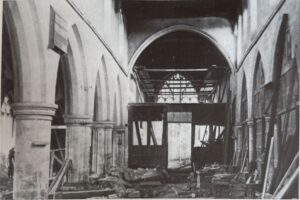
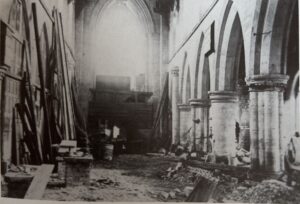
At 3 o’clock a well provided luncheon was set out in a marquee by Mr. Thomas Smith, to which 300 sat down. Lord Kesteven took the chair, supported by the Bisthop, W. Erie Welby, Esg. M.P., the Rev. W. Brooke, the Rev. W. Wayett, &c. A. Clark, Esq. the vice-chairman, was supported by Major Moore, of Frampton, the Rev A. Brook, Vicar of Holbeach, H. Clark, Esq. (churchwarden), Mr. Smith (architect) &c. – The chairman in giving “the Queen and Royal family.” said her Majesty had shown sympathy with the good work going on in this parish; she had contributed £200 towards the church restoration fund, and £100 to the church mission fund at Moulton Seas End. Although the Crown had estates in this parish the money was not paid from that revenue. They would all sympathise with her Majesty in the suffering which the dastardly attempt to assassinate her talented son on the other side of the world had caused. The Chairman next proposed the Bishop and Clergy,”. He had never on any former similar occasion met so large a body of the clergy as were now present. The way in which this great work of restoration had been conducted was a most remarkable proof of the soundness of feeling to the church, and it was worthy of note that so many gentlemen residing at the extreme ends of this fine parish (16 miles in length) had willingly contributed there share to the work, although they could hardly hope to share in the advantages. The way in which the fund bad been raised was a remarkable feature in this case; it had not been done by going round with begging letters with which he was so familiar; it was creditable to this spirited parish. He had called it a fine parish, and it was so in every sense, in extent, in opulence, and in its love of independence. He (the chairman) thought the works had been well carried out that they defied criticism. The Bishop, in returning thanks to the toast, expressed his pleasure at the privilege of attending on these occasions, which were in fact the bishop’s holidays for these happy days he had no cares; he knew all would go on well. They afforded opportunities of worshiping God with the people, and of saying a word to them, Such works were a great cause of gratification; they spoke of zeal and self-denial, The affluent gave cheerfully of their abundance, and often those of humbler means, in their abiding love, gave more liberally still. Self denial was shown in many ways. Not a few had very strong in prejudices to remove. They were deeply attached to the ugly pew of their early days; they loved it, and even its musty snell was associated with the fondest recollections of their lives, “It was the old seat where in childhood they bad sat under a loved parents care; and the dearest memories were associated with the oki pew” Many such said “Your new plans are all very well; my old pew shall go for your improvements, but like the old pew still” Now l, for one (continued his Lordship) respect such a man for the sacrifice he makes for the good of others. ln carrying out these works there are a number of things which bring forth the better feelings of parishioners. During the last 15 years 300 churches have been rebuilt or restored in this diocese. The results have been larger congregations, better church feeling, and more earnestness in religion. At the present time the church was assailed from without and within. Church rates were to go. Well, the people would not allow their churches to go to decay. The church was to be separated from the state in Ireland. Next in England, said some people. This would destroy our parochial system, which gave to every Englishman a right to a seat in his parish church, where the pastor was known to his flock. Then there were parochial vestries, and the people were trained in self government. This state of things would be dissolved, and probably a tyrannical centralization set up in its place. When he thought of these things, he rejoiced in the zeal he saw around him. He was no alarmist, and he took little heed of the passing storms of political life, for they soon cleared off. Major Moore of Frampton, replied on behalf of “the Army and Navy”, and observed that Moulton was his native village. In some measures he considered himself a pioneer in this work. When a young man he remembered returning from his studies at Oxford, and his first object was to examine this old church, here pulling down old boarding or pews, or scraping off stucco in search of hidden architectural beauties. Caution and secrecy were necessary in such matters in that day, for if any parishioner had caught him the sound would have gone forth that he was a Roman Catholic, or a Puseyite, or some such bugbear. They had now come to the resolve not to let the Catholics have it all their own way in the beautiful in church architecture; it was not in the revival of this taste that religion would suffer it was rather in that wide-spread carelessness and indifference to all religion or what pertained to it. In revisiting this his native church after many absent years, he was struck with the absence of many faces familiar to his youthful days; they had gone forever, yet there remained one who had been minister of this parish for a whole generation (the Rev. C. Moore, of Wyberton) bowed down with the weight of 80 years, who was with them in feeling on this day. Another 30 years and more of the present company will have passed away, but not without leaving their mark. The Bishop gave “the Lay Rector, Mrs. Johnson,” who had restored the chancel and “the Vicar,” who had so actively promoted the general work. The Rev. E. Moore replied on behalf of Mrs. Johnson, and remarked that Whaplode was the first to commence this work of church restoration in this Deanery and its restored chancel was the ugliest appendage he had seen to a church; the sooner it was pulled down the better. In the year 1292, Bishop Sutton, holding a court at Croyland, ordered the Moulton people not to hold their fairs and markets in the churchyard, but rather to set about repairing their campanile, and this was the origin of their most beautiful tower and spire. The Rev. J. R. Jackson, the Vicar, who was cheered very briefly returned the thanks, and acknowledged the services of is churchwardens, especially Mr. Clark, who has assisted him throughout, and the inhabitants and others who had so generously supported him. Mr. Alfred Clark gave “the old and new members of the South Division of the County.”
Lord Kesteven having replied, Mr. W. Earl Welby observed that this was the first time he had addressed public audience since his election. He had the greatest pleasure in renewing his acquaintance with this parish for his family 500 years his family having resided or owned property in it. Three of them had represented the family in Parliament, and it was a remarkable coincidence, along with a member of the Hussey (Packe) family. He trusted he should be pardoned for absenting himself from his Parliamentary duties for such an occasion as this, in a parish where his ancestors in days of yore have acted a prominent part. It had been a source of enjoyment to him to indulge in the reflections called forth of days lang syne in connection with Moulton. At this stage Lord Kesteven and the Bishop left to catch the train. The remaining toasts were quickly disposed of under the chairmanship of the Vicar. At the evening service the respected Vicar of Pinchbeck, the Rev. W. Wayett, preached the sermon.
